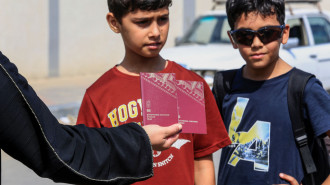At ICJ hearing, South Africa says Israel leaders made explicit remarks about Gaza genocide
South Africa said on Thursday that Israeli leaders have explicitly declared their genocidal intent in Gaza, asking the International Court of Justice (ICJ) to order provisional measures to protect Palestinians.
The United Nations' highest court held its first hearing in a case filed by Pretoria against Israel on 29 December.
While it may take years for the ICJ to ultimately rule on whether Israel has violated the Genocide Convention, any measures ordered in the meantime could provide a lifeline for Palestinians in Gaza – where a brutal Israeli war has killed almost 23,500 people, mostly women and children.
Lawyer Tembeka Ngcukaitobi, representing South Africa, said one percent of the Palestinian population in Gaza had been "systematically decimated".
'Extraordinary feature'
Ngcukaitobi also said there was an "extraordinary feature in this case".
"Israel's political leaders, military commanders, and persons holding official positions have systematically and in explicit terms declared their genocidal intent," he told the judges of the Hague-based ICJ, also known as the World Court.
"And these statements are then repeated by soldiers on the ground in Gaza as they engage in the destruction of Palestinians and the physical infrastructure of Gaza."
'Amalek'
Ngcukaitobi gave the example of a reference to Amalek made in a 28 October address by Israeli Prime Minister Benjamin Netanyahu following the start of the ground invasion of the strip.
"Netanyahu… urged the soldiers to 'remember what Amalek has done to you,'" the lawyer said.
"This refers to the Biblical command by God to Saul for the retaliatory destruction of an entire group of people, known as the Amalekites."
Ngcukaitobi said Netanyahu repeated this "genocidal invocation" in a 3 November letter to the Israeli armed forces.
Thursday's ICJ hearing comes after The Jerusalem Post reported that Israeli authorities plan to show at the World Court footage of the 7 October Hamas attack that killed 1,300 Israelis. The New Arab cannot independently verify the report.
No 'theatre for spectacle'
But lawyer Max Du Plessis, representing Pretoria, told the judges that South Africa has decided to avoid showing graphic footage and pictures in its evidence on Thursday.
"It has decided against turning this court into a theatre for spectacle. It knows as well as your excellencies the temptation for both sides in a dispute to parade pictures to shock," he added.
"But South Africa's application in this court today is built on a foundation of clear legal rights, not images."
Israel will present its arguments before the ICJ on Friday, starting at 10:00 local time (0900 GMT).
This week's hearings mark a key moment in Israel's efforts to maintain eroding legitimacy for its war among its Western allies – even as pressure mounts for an end to the hostilities.
Provisional measures
South Africa's ambassador to the Netherlands, Vusimuzi Madonsela, read out a request on Thursday asking the ICJ to order provisional measures including the immediate suspension of Israel's military operations in and against Gaza.
The court is expected to rule on possible emergency measures later this month.
Since Israeli forces launched their offensive, nearly all of Gaza's 2.3 million people have been driven from their homes at least once, causing a humanitarian catastrophe.
Israeli foreign ministry spokesperson Lior Haiat heavily criticised South Africa following Pretoria's hearing at the ICJ on Thursday.
"Today, we were witness to one of the greatest shows of hypocrisy in history, compounded by a series of false and baseless claims," he said on social media platform X.
He accused South Africa of functioning as the "legal arm of the Hamas terrorist organisation".
In its court filings, Pretoria cites Israel's failure to provide food, water, medicine, and other essential assistance to Gaza.
'Enough'
Amer Salah, 23, who is sheltering in a UN school in southern Gaza after fleeing his home, said he hoped the trial would help pile pressure on Israel.
"We call upon the world to say enough to Israeli killings, enough to massacres, enough to the destruction of Gaza, enough to the bloodshed," he was quoted as saying by Reuters.
Vaughan Lowe, a lawyer speaking for South Africa, told Thursday's hearing in The Hague that now was not a time for inaction from the ICJ.
"This is not a moment for the court to sit back and be silent," he said, adding that it was necessary for the ICJ to "assert its authority" and "order compliance with the obligations under the Genocide Convention".
"Indeed, it's hard to think of a case in recent history which has been so important for the future of international law, and of this court," Lowe said.
Reuters contributed to this report.




 Follow the Middle East's top stories in English at The New Arab on Google News
Follow the Middle East's top stories in English at The New Arab on Google News
![People gathered around the rubble of destroyed houses to search for survivors [Getty]](/sites/default/files/styles/image_330x185/public/2024-11/GettyImages-2184733820.jpg?h=199d8c1f&itok=NiM1LO2f)

